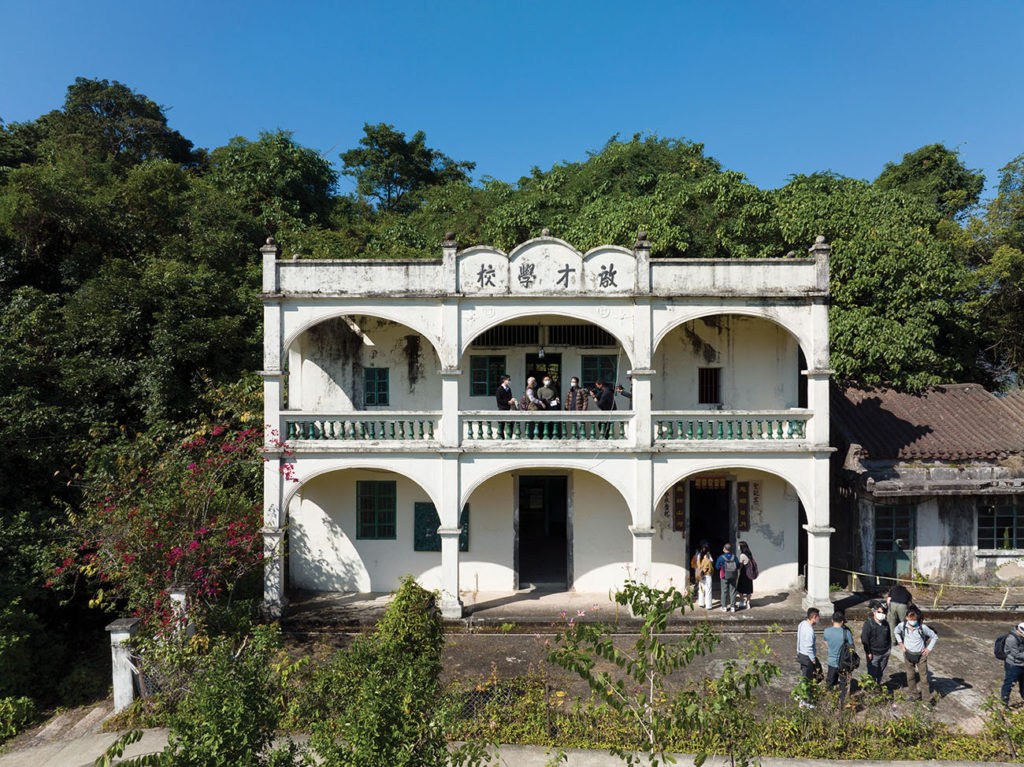Kuk Po: Resilient Regeneration
June 19, 2023
Kuk Po, similar to Lai Chi Wo and Mui Tsz Lam, is defined by its coast-to-hill topography, one that stretches from the picturesque expanse of mangrove and reed wetlands, emerging from the long-abandoned rice paddy grid, to the once-productive valley topography nurtured by numerous streams. Endowed with fertile lands and its gateway location facing northwards to Sha Tau Kok’s main markets across the water, Kuk Po thrived independently over three centuries on agriculture and as a transport hub for the area.

Besides its high scenic and ecological values, Kuk Po also possesses a rich variety of architectural heritage. With multiple surnames, it expanded from its main walled settlement of Lo Wai (literally “old village”) inland to five hamlets along Kuk Po River. Its 350-metre-long dam, constructed in the early 19th century, is the largest agro-reclamation among coastal villages nearby.
At the dam’s eastern tip is the pier with a popular Hakka eatery that occupies a historical watchtower, while sited at the western end is the distinctive 1930s Kai Choi School that also houses the village temple. In the flatlands are several prominent hybrid-styled mansions completed in the same era, as testimony to those early villagers who went overseas and sent back their fortunes to provide newer homes for their families.


In 2021, invited by villager-owners, a CUHK multi-disciplinary research team began From Valley to Plain, an action research project that aims to pioneer a university-village rural partnership for Kuk Po. A rundown three-bay, two-storey house in Ng To, Kuk Po’s innermost settlement, was appropriately rehabilitated and converted into a base for field studies and in-depth service learning.
[This is an excerpt. Subscribe to the digital edition or hardcopy to read the complete article.]

Thomas Chung is Associate Professor at the School of Architecture, The Chinese University of Hong Kong. He is an international award-winning architect who graduated from the University of Cambridge. Chung has been active in curating, exhibiting and steering the HK-SZ Bi-City Biennale of Urbanism\Architecture UABB since 2008. His award-wining projects Value Farm (2013) and Floating Fields (2015) fuse ecological design with socially innovative public space. Chung’s current research interests include countryside conservation projects, co-creative rural place-making and learning for well-being. He leads a multidisciplinary team with expertise in architecture, anthropology, geography and life sciences, and is consolidating a research hub on countryside-city regeneration.
Related stories:
Architectural Restorations for Remote Countryside Regeneration in Hong Kong



Read more stories from FuturArc 2Q 2023: Old is Gold!

To read the complete article, get your hardcopy at our online shop/newsstands/major bookstores; subscribe to FuturArc or download the FuturArc App to read the issues.
Previously Published Showcase
Contact us at https://www.futurarc.com/contact-us for older commentaries.
